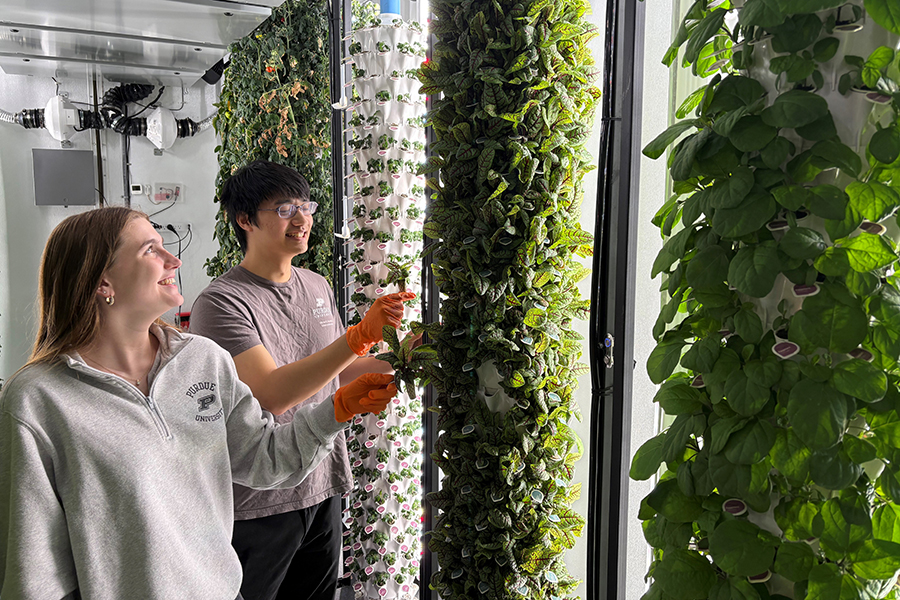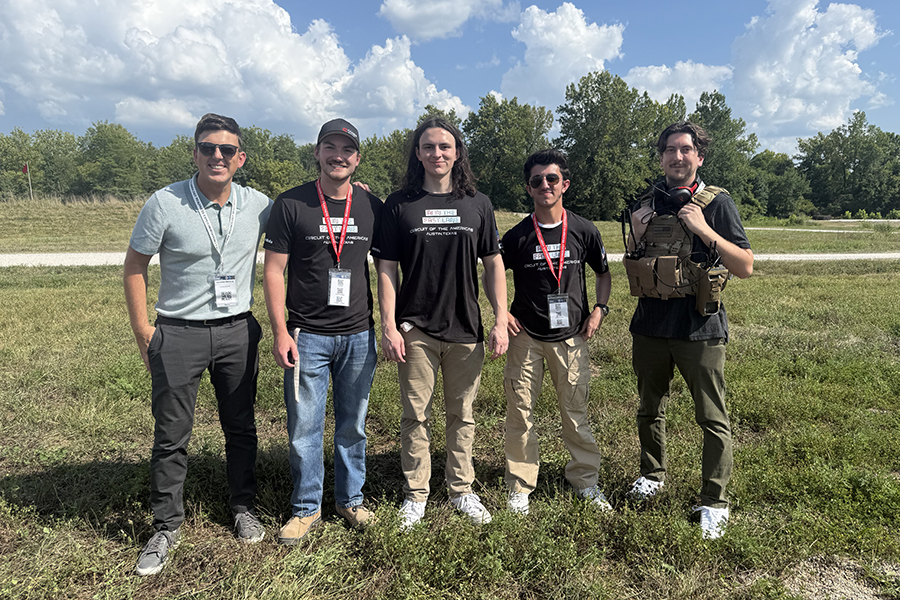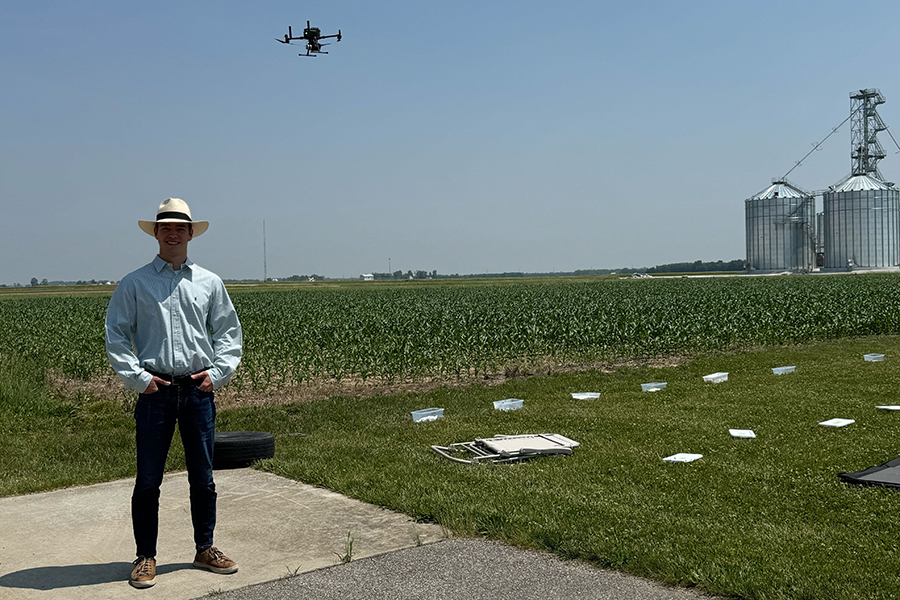Interns for Indiana opens startup experiences to Purdue engineering students

Lindsey Laine knew anu CEO Scott Massey trusted her to make a good presentation for the company’s hydroponic shipping container, a soil-free garden for all seasons.
What Laine hadn’t expected was for Massey to hand her the pointer and give the presentation to stakeholders instead.
Being in the driver’s seat of an internship is par for the course for students participating in Interns for Indiana (IFI), a program run by Purdue’s Office of Professional Practice (OPP).
“(Scott) really threw me in and, honestly, I have never been more grateful for that,” said Laine, a sophomore studying biomedical engineering (BME) at Purdue University in Indianapolis, who had a Food as Medicine internship at anu. “I got to portray and explain confusing topics so simply that (anyone) could pick up the information. Creating those graphs was challenging, but I also became a much better speaker because of it.”
Laine credits the summer internship — and IFI — with changing her BME trajectory from prosthetics to gardening and nutrition, tying childhood interests inherited from her engineer and forensic criminologist parents into a career. The Food as Medicine internship focused on using food and nutrition science to address health issues, especially in communities where regular medical care is not accessible.
Laine would have missed the Summer 2025 opportunity if she hadn’t taken a chance with IFI.
She had no idea IFI existed until she was introduced to Massey during the Fall 2024 semester in ENGR 103: Introduction to Professional Practice. All first-year students in engineering are strongly encouraged to enroll and Laine was one of multiple students who landed internships through connections from the course. Companies involved include Eli Lilly and Company, Glassboard, Neurava, Rolls-Royce and anu. Anu’s focus on nutrition — and producing high-quality food for whole communities — caught Laine’s attention.
“I still remember after the guest lecture, Lindsey spoke to me about how she could get in touch with Scott,” said Patrick Francis, the course instructor at the time — and now the director of career relations in Indianapolis. “We worked together on crafting a message to express her interest in anu.”
When Laine learned that anu was based in Evansville, Indiana, her hometown, she felt like it was meant to be.
“I loved every second of (my internship),” Laine said. “Because of the amount of trust that (anu) put in me, I got to experience things that, honestly, people who have been working for a company for years might not even get to experience.”
IFI, launched in 2004 in West Lafayette, supports the talent search process with Indiana high-tech startup companies and offers cost-share benefits for intern stipends. High-performing Purdue undergraduates have a one-of-a-kind experience as they are immersed in every aspect of the business, impact technology and are exposed to the ecosystem of startups in a challenging, fast-paced entrepreneurial environment. Students spend 40 hours a week for a minimum of 10 weeks in a company, working with small teams and interacting with founders and top leaders.
The program attracts strong interest from engineering students. As of 2024, IFI has placed 73 interns from a total of 1,879 applicants in 10 industry sectors.
Anu, one of 20 current IFI partners, was created by Purdue alums and repurposes shipping containers for community-sized hydroponic gardening, or gardening without soil. Laine worked in maintaining anu’s storage crate hydroponic gardens, which she called “a (coffeemaker) for food.” The system enables year-round harvests with 40-day cycle periods, an exponential increase from greenhouses’ abilities. The shipping containers can hold close to 3,900 plants and feed up to 100 people daily with nutritious, safe produce.
Best of all: Produce is free to the whole community surrounding anu’s home base.
“All of the produce tastes fresh and rich,” Laine said. “Whenever you walked into one of the big containers, it felt like you were in a completely different world. The air was crisp and it was euphoric to be in there.”
Laine’s summer schedule included weekly calls with the We Grow Aces program through the University of Evansville, who are using anu’s storage containers to start growing projects in local neighborhoods that struggle with food and nutritional insecurity. Anu’s system of plant production is uniquely situated to address these issues; Plants eaten most closely to the point of consumption surpass minimum requirements for food safety and launch far past the typical nutritional value of store-bought produce.
It also allowed Laine to explore how BME could positively impact her Evansville community in the struggle against Type 2 diabetes. About 50% of the United States adult population is affected by diabetes or prediabetes and is not the only country struggling with nutritional deficits.
“There are so many nutrition problems in our community and our diet, especially in the U.S. and countries that have very extreme weather conditions,” Laine said. “It’s something I was passionate about with anu. I've had family members that eventually died because of diabetes. And I know several people that have lost limbs because of it.”
Reading stakeholders’ body language and anticipating questions in her presentations became second nature for Laine, as was sharing her passion for health and wellness as biomedical engineering. But the client meetings and maintenance on the hydroponic storage containers weren’t the only ways Laine would grow.
Massey invited Laine to the annual Global Entrepreneurship Congress in June 2025, featuring impactful speakers from Fortune 500 companies. The executives, engineers and other interns she was able to encounter expanded her career horizons and ambitions.
Laine would call it a highlight, but the internship was so chock-full of high points that it would be nearly impossible to choose. The experience was beyond eye-opening.
“Purdue completely opened up my world, and Patrick really helped with that (by) bringing in all the different speakers because he showed me all the different paths that I can take as a BME …it's so open and so diverse. (Engineering) was not limited to what I once thought it was.”
Racing to TREX
Tyler Sivertsen (BSECE ’25) talked to Francis about his fascination with AI. Sivertsen wanted to experience and pioneer programming to make a real difference. So when Francis introduced Sivertsen to Code19 Racing, Sivertsen couldn’t say no.
“Tyler always had a vision to be a part of something bigger,” Francis said. “I had been working with him for a while on finding the right internship for him. He knew about IFI from previous years, but it wasn’t until we brought on Code19 that he really connected the dots, partially because of his interests and the type of role they offered.”

Code19 Racing uses conversational AI and advanced planning software to create driverless race cars that respond in record time to human notes. According to Code19 Racing, having an autonomous car is ideal for high-stress situations because of its adaptability — both to human commands and to what its sensors pick up via multi-level tracking and proximity detection.
When Sivertsen started his IFI experience in May 2025, the focus was on autonomous racing vehicles for the Autonomous Racing League in Abu Dhabi, as close to Formula 1 racing as Sivertsen would get in undergrad. But the uses of Code19’s software extended from racing into the national defense sector. Drone swarms were becoming a part of the conversation, and Code19 sought to create an AI agent system that could be used to interact with and command drones in real time.
Of the two paths presented to him, Sivertsen chose voice-controlled autonomous drones.
“I was most interested in the embedded AI system, which (entails) finding ways that you can be offline and still use it,” Sivertsen said. “I gravitated towards the defense sector. It’s big research right now because everyone's shooting to be the next military-grade thing that gets adopted.”
Sivertsen was part of a two-person team working on the AI device. When the second employee left his position, Sivertsen became the sole engineer behind the project Code19 Racing was showcasing at the Technology Readiness Expo (TREX).
It was exactly what Sivertsen was looking for.
“I wanted the feeling of being heavily relied on. I wanted to feel like the things I was doing were impactful,” Sivertsen said. “I had all these managers and colleagues saying, ‘Hey, you need to make this work because you’re the only person on this.’”
The internship entailed many long days of testing, re-testing and troubleshooting, but the successful test at TREX in front of personnel from the Office of the Undersecretary of Defense for Research and Engineering (USD R&E) made it worthwhile. Sivertsen had become the resident expert on the sensors, the building process and the potential applications in just one summer. When the USD R&E had questions, Sivertsen was the one to answer.
“It was a lot of weight on my shoulders. But that was also what I was hoping to get out of an internship because I wanted that feeling of responsibility,” Sivertsen said. “I learned a lot and it forced me to be better as an engineer, problem-solver and employee in general.” .
Coding and baking powder
Standing in a cornfield in the Indiana Corn and Soybean Innovation Center, in Summer 2025, Nicolas Makovnik was celebrating a breakthrough. Makovnik was ecstatic that the sensors he’d been working on at GRYFN were able to distinguish baking soda and salt — and six other powders — from over 60 meters away.
It was even more impressive that the sensors were also connected to a moving drone. It was just a proof of concept at the moment, but the potential applications of the breakthrough would be limitless.
Makovnik, a sophomore in aeronautical and astronautical engineering, discovered GRYFN through Francis.
“Nicolas and I met through a spring break study away trip and we stay connected,” Francis said. “When he shared that his plans for summer had changed, I suggested he pursue GRYFN, as they were a new partner for IFI in 2025.”
GRYFN began as a Purdue plant breeding project and blossomed into a full-scale business. The startup creates sensors that measure plant breeding success by collecting wavelength data and LiDAR (light detection and ranging) measurements, but GRYFN’s tools have potential uses for applications in natural resources, mining and defense.
Those new possibilities were a contributing factor to Makovnik’s internship.
“I really like optical software engineering, which is completely unrelated from aero, but there's a huge market for it (within aero),” Makovnik said. “There are developing programs like Starlink that communicate with each other using optical communications and lasers, because the amount of data you can pack into light depends on the wavelength.”
Makovnik’s internship focused on software engineering, including coding and investigating the potential for material recognition using wavelength data in the field, both when stationary and when moving at a distance.
That meant a lot of time behind a desk, and a lot of time sorting through large-scale files. Makovnik still spent plenty of time in the field, attaching sensors to drones and setting up proof of concept tests. He was often side by side with the full-time engineers or the C-suite leadership when showing off software or testing sensors. It was a big change from his previous internships, one that makes IFI experiences unique.
“Last summer at (my 2024 internship), the mentors were often very busy and would sometimes have less time for us.” Makovnik said. “But here, because it’s a startup, it was very tight knit, and they always made time. If I messaged my supervisor, he’d get back to me right away, and I could always walk down the hall and ask somebody a question.”

